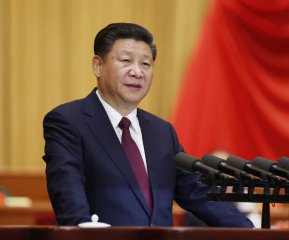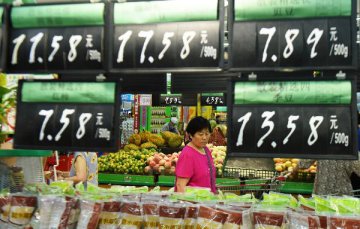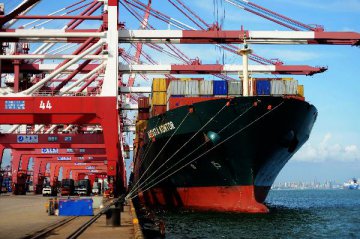
Several important economic indicators which have been released since August indicate improvement in China’s macro-economic growth and many foreign-funded institutions raise expectation for China’s economic growth. Analysts point out that as short-term risk of China’s economy has weakened and economic structure is being optimized, the function of consumption as economic stabilizer is increasingly strengthening.
Economic transformation boosts growth potential
The important economic indicators which have been released recently beat expectation, enhancing market’s confidence in China’s economy. According to the National Bureau of Statistics (NBS), the PMI in October registered 51.2, the best performance since August 2014 and business activity index of non-manufacturing industry posted 54.0, also the highest level in this year. Noticeably, after a nosedive in the first half of this year, growth rate of private investment saw a positive growth of 2.5 percent in August and further picked up to 4.5 percent in September, becoming an important signal of economic recovery.
Morgan Stanley upwardly revised its outlook for China’s GDP growth rate from the previous 6.4 percent and 6.2 percent to 6.7 percent and 6.4 percent for 2016 and 2017 respectively at the report unveiled in the first half of October. Xing Ziqiang, a chief economist from Greater China of Morgan Stanley, believes that financial support from Chinese government will bring cyclical growth momentum and there will be stronger external demand.
Anther foreign institution United Bank of Switzerland (UBS) also raised its expectation for China’s GDP growth in 2016 to 6.7 percent. The reason is that domestic demand like consumption gets stable, year-on-year growth of industrial production keeps flat, and added value of tertiary industry is expected to see slightly improvement driven by real estate industry. Analysts from the UBS point out that the frequent activities in real estate industry since this year helps stabilize real estate and industrial investment and boost relevant consumption.
Attention should be paid to the fact that tertiary industry plays an increasingly important role in contributing to China’s economy and driving economic growth. Analysis points out that China’s economic structure continues to be improved, added value of tertiary industry and industry enjoy stable growth, and the function of consumption as economic stabilizer is gradually strengthening.
International Monetary Fund (IMF)up-regulated expected economic growth of Chin in April and July as tertiary industry offset decline in manufacturing. IMF indicates that expected growth rate is based on the successful economic transformation. Tertiary industry and consumption should be boosted so that long-term economic expansion will see sustainable development.
Stephen Roach, former chief economist from Morgan Stanley, refuted the “theory of China’s economic collapse”. In his opinion, China is able to realize transformation of economic structure with its strategy and financial resources and will be developed into a tertiary industry-based consumption society and can avoid cyclical crisis.
Goldman Sachs thinks that China’s economy is shifting from “old economy” depending on investment, manufacturing and export to “new economy” based on tertiary industry and its status in the value chain of global economy is enhancing.
Foreign funds rosy about new economy
Besides adjusting Chinese economic outlook, foreign institutions are also rosy about performance of China’s “new economy”. Fan Zhuoyun from Hongkong and Shanghai Banking Corporation Limited is optimistic about stocks of companies related to the “new economy”, including tertiary industry, Internet-based high-end manufacturing, financial technology, clean energy, medical health and education.
Xu Jian, director of China’s securities department of UBS Securities, says that despite facing challenges from excess production capacity and increasing debt, growth of China’s new economy is still very dynamic and is attracting attentions of international investors. Gao Ting, head of China strategy at UBS Securities, indicates that investors focus more on companies engaged in food and drinks industry and medical health industry.
Goldman Sachs up-regulated the investment rating of MSCI China Index in its strategy report of Asia-Pacific stock market in September. Liu Jinjin, managing director of Goldman Sachs, said in an interview of China Securities Journal that research team of Goldman Sachs considered that returns of stocks in China mainland and Hong Kong markets are supposed to be good although it was not quite rosy about the overall global stock market.
Mark Mobius, executive chairman of Templeton Emerging Markets Group, who is called as “godfather of emerging markets”, indicates that China is still an economic engine and he is pleased to see that China is growingly focusing on domestic consumption per capital income is increasing. Mark Mobius says that the appearance of super e-commerce giant like Alibaba proves that China’s domestic demand is hiking gradually. China is facing increasing consumption, which is expected to keep growing, and it is still one of the most attractive emerging markets. Information reveals that more than 20 percent of funds held by Mark Mobius are invested in China now.
Translated by Vanessa
























Latest comments